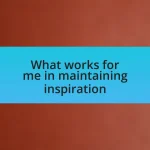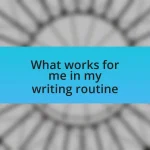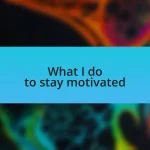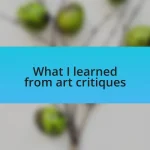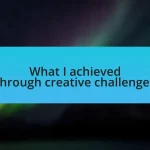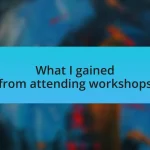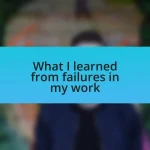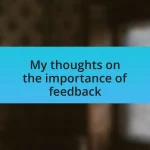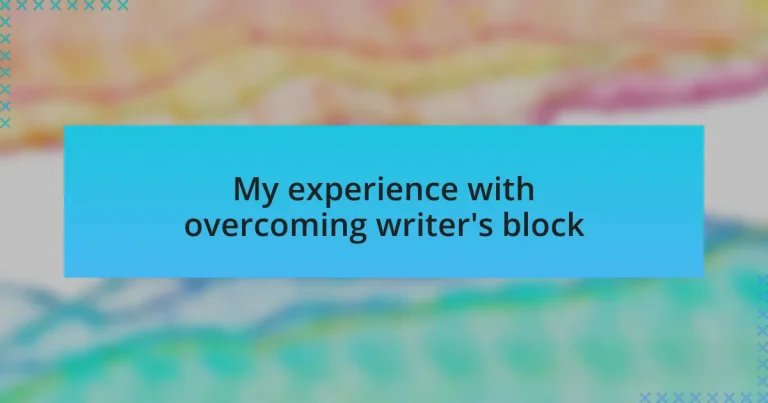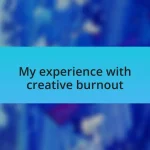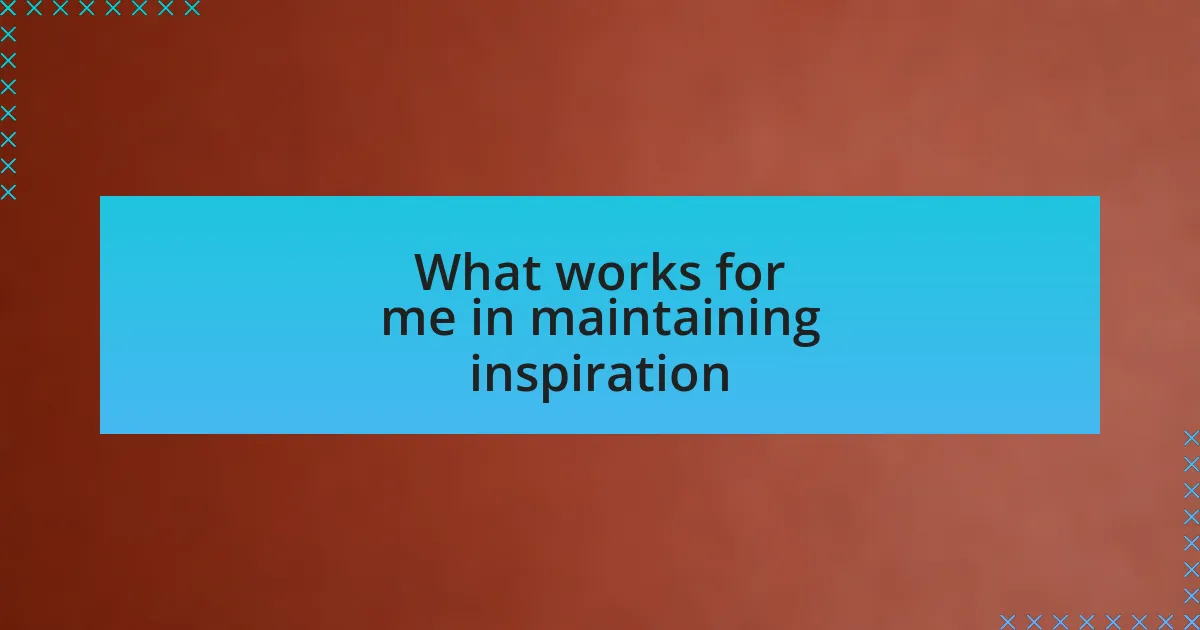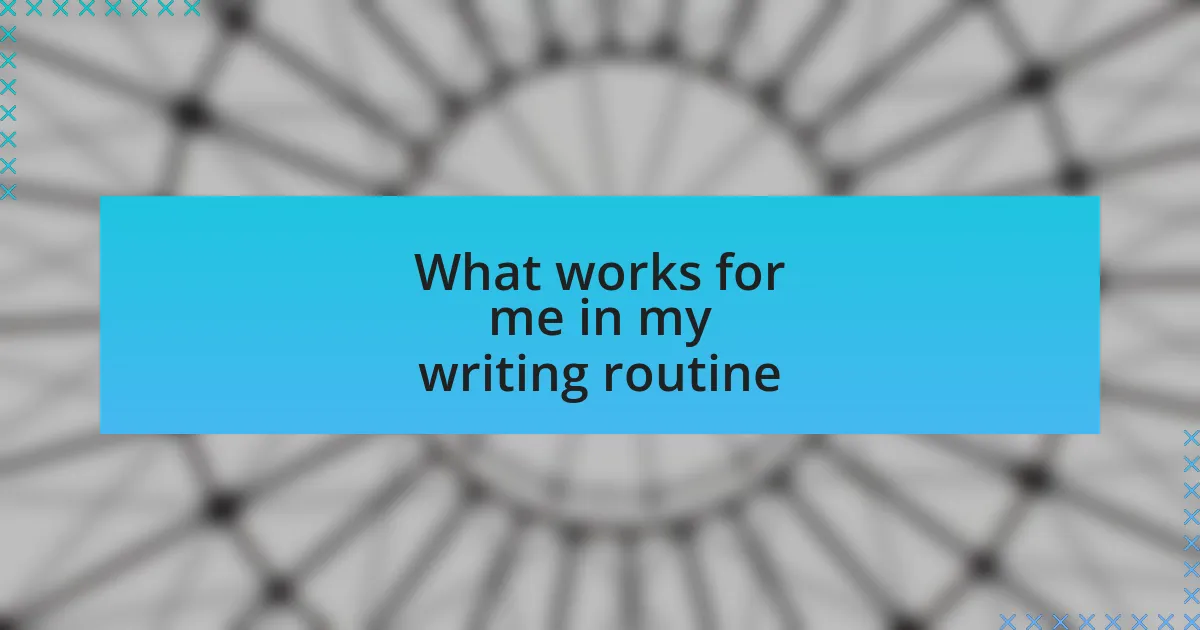Key takeaways:
- Writer’s block is often an emotional response influenced by perfectionism, stress, and fatigue.
- Effective strategies to overcome writer’s block include setting timers for writing bursts, changing environments, and engaging in free writing.
- Maintaining creativity can be achieved through changing surroundings, establishing a writing routine, and allowing for rest.
- Embracing imperfection and seeking feedback are crucial for personal growth and enhancing writing authenticity.
Author: Clara Whitmore
Bio: Clara Whitmore is an acclaimed author known for her evocative storytelling and richly detailed character development. With a background in literary studies, she weaves themes of identity and resilience into her work. Clara’s debut novel, “Echoes of Yesterday,” was met with critical acclaim and has been translated into multiple languages. When she’s not writing, Clara enjoys exploring the great outdoors and immersing herself in diverse cultures. She currently resides in Portland, Oregon, where she is working on her next novel.
Understanding writer’s block
Writer’s block can feel like an insurmountable wall. I’ve been there, staring blankly at the screen, wondering if my creative spark had just vanished. It left me questioning my abilities, igniting a mix of frustration and self-doubt that was hard to shake off.
This struggle often stems from various sources, whether it’s pressure to perform or fear of criticism. I remember a time when I had an important deadline looming, and the weight of expectations stifled my creativity like a heavy blanket. How many times do we let our anxious thoughts paralyze us instead of simply writing through them?
Ultimately, understanding that writer’s block isn’t just a sign of a lack of ideas but rather a complex emotional response can be liberating. By acknowledging this, I’ve learned to embrace the pauses in my creative flow, treating them as necessary breaks rather than failures. Isn’t it fascinating how sometimes, giving ourselves permission to breathe can unlock our minds?
Causes of writer’s block
It’s intriguing how different factors can contribute to the experience of writer’s block. One major cause can be the overwhelming perfectionism that often plagues creative individuals. I recall a period when I was so fixated on crafting the perfect sentence that I couldn’t write anything at all. Have you ever felt like your own standard of excellence has pushed you into a corner?
Stress and fatigue are also significant players in this unfortunate scenario. When I juggled multiple projects, I felt my thoughts becoming muddled, and any creative idea seemed to vanish. The irony hit me hard – the more I tried to force creativity, the more it eluded me. Isn’t it ironic how a simple lack of rest can steal away our creative flow?
On top of that, a lack of inspiration can trigger writer’s block too. I’ve struggled with this during long stretches of uninspired days, staring outside, longing for that spark. It made me wonder—what if inspiration isn’t just found, but cultivated? Engaging with different mediums of art or exploring new ideas can often rekindle that flame.
Strategies to overcome writer’s block
When it comes to battling writer’s block, one effective strategy I’ve found is setting a timer for short writing bursts. This technique transforms the daunting task of writing into something manageable. I often set mine for 15 minutes, and surprisingly, this little trick can help unleash a flow of ideas. Have you ever noticed how giving yourself permission to write poorly can be liberating?
Another approach that has worked wonders for me is simply stepping away from the writing desk. I remember a particularly frustrating day when I took a walk in nature, letting my mind wander freely. It was during that stroll that new thoughts began to form, sparking my creativity in ways that sitting in front of my screen couldn’t. Isn’t it fascinating how a change of scenery can offer fresh perspectives?
Lastly, I often turn to free writing as a way to clear the mental fog. It feels like a brain dump where nothing is off-limits—no judgments, no restrictions. I recall once writing about my frustrations with writing itself, and surprisingly, that very act helped me identify the root of my block. Have you considered that sometimes, just letting your thoughts flow without concern for coherence can lead to productive breakthroughs?
My personal tools for inspiration
One of my go-to tools for inspiration is creating a mood board filled with images, quotes, and colors that resonate with my current project. I recall a time when I was struggling to find direction for a new piece, and piecing together visuals helped spark ideas I hadn’t considered. Have you ever noticed how a simple image can evoke strong emotions or memories, igniting creativity in unexpected ways?
Another essential tool in my creative arsenal is listening to music that aligns with the mood I want to capture in my writing. I often find that melodies can evoke specific feelings, and I remember a day when a haunting ballad brought tears to my eyes, allowing a deep well of emotion to surface in my writing. Isn’t it amazing how sound can transcend words and push you into a different emotional space?
Lastly, I keep a small journal dedicated solely to dreams and random thoughts. I once had a vivid dream about a conversation with an old friend, and jotting down those details yielded intriguing story ideas. Have you ever considered how your subconscious might be nudging you towards your next breakthrough while you sleep? It’s a powerful reminder that inspiration often lurks in the most unexpected places.
Techniques for maintaining creativity
A technique I’ve found particularly effective for maintaining creativity is changing my environment. I vividly remember when I relocated to a cozy café instead of my usual writing space. The ambient chatter and the scent of freshly brewed coffee opened up new avenues of thought, reminding me how important it is to shake things up. Have you ever noticed how a fresh setting can invigorate your mind?
Another approach I embrace is the practice of free writing. There was a time I committed to writing for just ten minutes daily without worrying about grammar or structure. This unfiltered expression helped me access thoughts I didn’t even know were buried within. It’s liberating to let go of perfection, isn’t it? Finally, I’d encourage you to explore collaborative brainstorming sessions with fellow creatives, as bouncing ideas off each other can lead to unexpected connections and revelations.
How to sustain long-term productivity
When it comes to sustaining long-term productivity, I’ve found that setting achievable goals really makes a difference. I recall a project where I broke my writing tasks into manageable milestones. Each small victory boosted my motivation, and by celebrating those little wins, I could see my progress more clearly. Have you ever experienced that rush of accomplishment after completing a task?
Another key strategy I’ve adopted is the discipline of a routine. For me, dedicating specific hours to writing every day creates a rhythm that’s hard to break. I’ve noticed that consistency cultivates a habit, making it easier to dive into my work even on days when inspiration seems elusive. What routines work best for you in keeping your creativity flowing?
Lastly, I believe in the power of rest. There was a time when I pushed myself to extremes, thinking that relentless work equated to greater productivity. It took me a while to realize that stepping away for a breather often leads to my best ideas. After all, don’t you find that sometimes, the best inspiration strikes when you least expect it?
Lessons learned from my journey
Throughout my journey, I learned the importance of embracing imperfection. There were countless moments when I felt paralyzed by the need for everything to be flawless. I vividly remember a time when I allowed a single typo to derail my confidence, holding me back for days. But in embracing my flaws, I found liberation; my writing became more authentic and relatable. Have you ever noticed how raw emotion can resonate deeper than a polished piece?
Another lesson I cherish is the value of seeking feedback. Initially, I hesitated to share my drafts, fearing criticism. However, I soon discovered that constructive input from peers illuminated blind spots I never knew existed. I once received a simple suggestion about character development that completely transformed a story I had been stuck on for weeks. Isn’t it fascinating how collaboration can spark new life into our creative endeavors?
Lastly, I realized that sometimes stepping outside my comfort zone can lead to the most significant breakthroughs. I recall a workshop I attended on poetry, despite primarily identifying as a fiction writer. The experience was daunting but exhilarating. It pushed me to explore different styles and approaches, enriching my overall writing voice. Have you stepped outside your creative box lately? Those moments often lead to the most unexpected growth.

